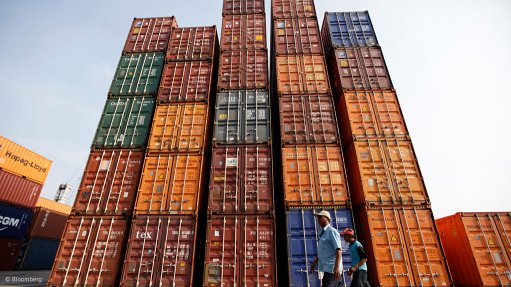
Photo by: Bloomberg
South Africa's trade relations with China over the past 15 years have played a fundamental role in ensuring the nation overcame the economic crisis that had buckled many developed countries in the past few years.
"We were able to insulate ourselves much better [against the realities of the economic breakdown] on the back of the bond between the two emerging economies," International Relations and Cooperation Deputy Minister Marius Fransman said at the South Africa–China Ambassadorial Forum, in Pretoria, on Thursday.
Since the establishment of a diplomatic relationship between the two countries in 1998, many strides have been made in strengthening ties.
The People's Republic of China Ambassador to South Africa Tian Xuejun said the partnership had been elevated to a strategic partnership in 2004 and a comprehensive strategic partnership in 2010.
Bilateral trade volumes increased 40-fold, from $1.5-billion when the partnership was formed, to $60-billion by 2012.
During the first eight months of this year, trade volumes between the two countries reached $44.2-billion – already 13.3% higher than the same period last year.
China's trade with Africa had increased from $20.5-billion in 2000 to more than $200-billion in 2012. The Asian giant had also become South Africa's largest trading partner country, largest export market and largest source of imports for the past four consecutive years.
Further, South Africa had become China's largest trade partner on the continent.
Xuejun noted that South Africa and China, which were both in a key transitional period, had supported each other for common development for over a decade.
With the uncertain international economic and financial landscape, the parties' bilateral relationship formed the best example of how cooperation could assist emerging economies and developing countries to ride out the worldwide economic turmoil.
"Global economic recovery is still weak and fragile. The spillover of the monetary policies of some developed countries has started to be felt and a number of emerging economies are experiencing turbulence in their financial markets," said Xuejun, comparing the South Africa–China partnership to a large vessel proceeding with "sails" of unity, cooperation and friendship.
But South Africa and China needed to now examine ways of lifting the partnership to a higher level and expanding and improving bilateral trade, as well as scaling-up two-way investment.
Fransman said the joint Ministerial working group would facilitate supportive themes starting next year, with the "year of South Africa in China" and, in 2015, as "the year of China in South Africa".
The working group, which would meet next month, would work to establish a stronger bilateral agreement and ensure a more balanced and equitable strategic partnership.
The mutually beneficial tie-in should see an increase in skills and knowledge transfers and the facilitation of cooperation in projects such as trade, investment, infrastructure, energy, communications, agriculture and human resources.
Education, science and technology and culture cooperation should also be explored.
Fransman added that the benefits of the partnership should be coordinated regionally to filter down to small and medium-sized businesses countrywide and ensure that Africa benefited from these developments.